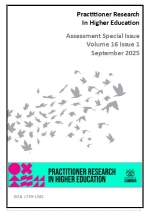Rationalising subjectivity: using learning technology to automate and flexibilise marker standardisation in higher education assessment
##plugins.themes.bootstrap3.article.main##
Abstract
When designing a marker standardisation training programme, institutions must respond to their context and choose the method appropriate to it. This article details an approach based on a self-access, automatic package of training materials that can be flexibly deployed via a learning management system. This responds to the needs of a large, multi-centre teaching network marking shared assessments, providing an authentic, flexible, and inclusive experience that is worth the up-front resource cost and has been broadly positively received. Lessons have been learned centring on the implementation of this method of training, communicating the intention behind the change, and the approach to adapting it to suit an academic community of practice. The training methodology and evaluation may serve as informative to other institutions seeking an approach to standardisation that meets their needs.
##plugins.themes.bootstrap3.article.details##
Proposed Policy for Journals That Offer Delayed Open Access
Authors who publish with this journal agree to the following terms:
- Authors retain copyright and grant the journal right of first publication, with the work for one year after publication simultaneously licensed under a Creative Commons Attribution License that allows others to share the work with an acknowledgement of the work's authorship and initial publication in this journal.
- Authors are able to enter into separate, additional contractual arrangements for the non-exclusive distribution of the journal's published version of the work (e.g., post it to an institutional repository or publish it in a book), with an acknowledgement of its initial publication in this journal.
- Authors are permitted and encouraged to post their work online (e.g., in institutional repositories or on their website) prior to and during the submission process, as it can lead to productive exchanges, as well as earlier and greater citation of published work (See The Effect of Open Access).

